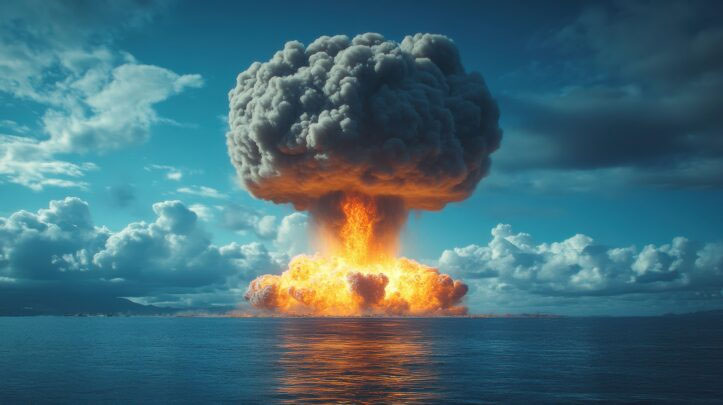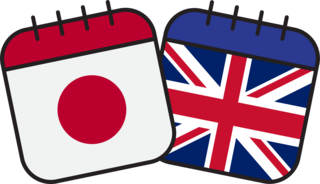
Radiation exposure and long-term health effects: Japanese atomic bomb survivors and British veterans
- 12 May 2025
- 5:00pm – 7:30pm
- Daiwa Anglo-Japanese Foundation, G13/14 Cornwall Terrace, Outer Circle (entrance facing Regent's Park), London NW1 4QP
- https://dajf.org.uk/event/radiation-exposure-and-long-term-health-effects-japanese-atomic-bomb-survivors-and-british-veterans
- +44 (0)20 7486 4348
- events@dajf.org.uk
- Tweet
In August 1945, one month after the first nuclear weapons test, the US detonated atomic bombs over Hiroshima and Nagasaki, causing terrible human devastation. Survivors of these events (hibakusha) continue to suffer long-term physical and psychological effects even today.
In the decades following the end of WWII, nuclear tests continued in various places. British service personnel were also exposed to nuclear bomb tests carried out on Christmas Island in the late 1950s. Ever since, those affected have been denouncing the long-term health effects of radiation exposure and demanding compensation.
In this seminar, Masao Tomonaga will explain the long-term effects of atomic bombs on human health from a medical perspective. Susie Boniface will talk about British veterans exposed to nuclear tests and the physical effects on their health, based on her interviews with them.
- Physical copies of Exposed: The Secret History of Britain’s Nuclear Experiments will be available to purchase for £20.00 (cash only) during the drinks reception following this event
About the contributor
Masao Tomonaga
Dr. Masao Tomonaga is Director Emeritus of the Japanese Red Cross Nagasaki Atomic Bomb Hospital. He was born in Nagasaki City in 1943, where he experienced the second atomic bomb on August 9th, 1945. He was just two years old at the time, and survived in a half-destroyed wooden Japanese house located around 2.5 km from the hypocentre. He grew up healthy and became a distinguished physician specializing in atomic bomb-related medical care for hibakusha (atomic bomb victims). For over five decades, he has led pioneering research into the links between radiation exposure and the development of leukaemia and other cancers. Following the 2024 Nobel Peace Prize ceremony in Oslo, he gave a lecture both drawing on his personal history and lifelong commitment to nuclear disarmament, and also explaining the inhumanity of nuclear weapons from a scientific perspective.
Susie Boniface
Susie Boniface has been a journalist on national and local newspapers, broadsheet and tabloid, dailies and Sundays, since leaving school. She started work at the Kent & Sussex Courier aged 18 and was the first female defence reporter for the Plymouth Evening Herald. She has worked almost everywhere in Fleet Street, and spent 10 years at the Sunday Mirror covering international crises including the Boxing Day tsunami and Niger famine. For the past 20 years she has reported on the campaign for justice and recognition of Britain’s nuclear test veterans, and in 2022 uncovered the Nuked Blood Scandal – the first proof of human experimentation on troops. She is a columnist, commentator, media consultant, university lecturer in journalism, and press awards judge. Her recent work includes being Special Advisor to the BBC documentary Britain’s Nuclear Bomb Scandal: Our Story.
Professor Barry Buzan (moderator)
Professor Barry Buzan is Emeritus Professor of International Relations at the London School of Economics and Political Science (LSE), Honorary Professor at Copenhagen and Jilin Universities, and a Senior Fellow at LSE Ideas. During 1993 he was a Visiting Professor at the International University of Japan. In 1998 he was elected a fellow of the British Academy. Among his recent books are: Rethinking Sino-Japanese Alienation: History Problems and Historical Opportunities (2020, with Evelyn Goh, Oxford: Oxford University Press); with Robert Falkner (eds.) (2022) Great Power Responsibility and Global Environmental Politics, Oxford University Press; Making Global Society: A Study of Humankind Across Three Eras (2023) Cambridge University Press; with Robert Falkner (2025) The Market and Global International Society: An English School Approach to International Political Economy, Oxford University Press; Timelines for a New World (Dis)Order: Rethinking Periodization for Global International Relations (2025), Bristol University Press.
Booking Essential | Admission Free
